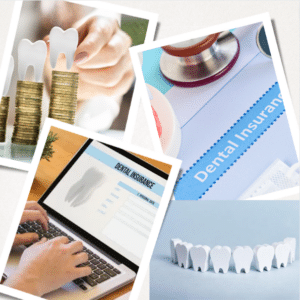Understanding Dental Insurance and Financing Options
As much as we would all love to have perfect teeth, the reality is that dental care can be quite expensive. That's where dental insurance and financing options come into play. In this blog post, we'll explore what dental insurance is, what financing options are available, and how to choose the best one for your needs.
What is Dental Insurance?
 Dental insurance is a type of health insurance that is designed to help you pay for dental care. Like other forms of insurance, you pay a monthly premium to be covered. In exchange, you receive certain benefits that help offset the cost of dental procedures.
Dental insurance is a type of health insurance that is designed to help you pay for dental care. Like other forms of insurance, you pay a monthly premium to be covered. In exchange, you receive certain benefits that help offset the cost of dental procedures.
Most dental insurance plans cover preventative care, such as routine cleanings and check-ups, at little or no cost to you. More extensive procedures, such as fillings, root canals, and crowns, are typically covered at a percentage, usually 50-80% after you meet your deductible. Orthodontic treatment, such as braces, is also often covered, but usually at a lower percentage, around 50%.
What Are the Different Types of Dental Insurance?
There are three main types of dental insurance:
- Indemnity Plans - This type of plan allows you to choose any dentist you want and pay for services as you go. The insurance company reimburses you for a portion of the cost, based on a fee schedule. These plans usually have a higher monthly premium but offer more flexibility.
- Preferred Provider Organizations (PPO) - PPO plans have a network of dentists who have agreed to accept a reduced fee for services. You have the option to see a dentist outside of the network, but you will usually pay more out of pocket. These plans usually have a lower monthly premium than indemnity plans.
- Health Maintenance Organizations (HMO) - HMO plans also have a network of dentists, but you must choose a primary care dentist who will coordinate your care. You may not be able to see a specialist without a referral from your primary dentist. These plans usually have the lowest monthly premium but the least flexibility.
What Financing Options are Available for Dental Care?
If you don't have dental insurance or your insurance doesn't cover the entire cost of a procedure, there are several financing options available.
- Dental Savings Plans - Similar to insurance, dental savings plans allow you to pay a yearly fee to receive a discount on dental procedures. These plans usually have no deductibles, waiting periods, or annual maximums.
- Credit Cards - Many dentists accept credit cards, which can be a good option if you have a rewards card that offers cash back or other perks. However, be careful not to rack up too much debt.
- Personal Loans - You can also consider taking out a personal loan to pay for dental procedures. Many lenders offer loans specifically for medical expenses, with interest rates that are often lower than credit cards.
- Payment Plans - Some dental offices offer payment plans that allow you to pay for procedures over time, rather than all at once. Be sure to ask about any interest or fees associated with these plans.
How to Choose the Best Dental Insurance or Financing Option for You?
Choosing the best dental insurance or financing option for you depends on several factors, including your budget, the type of procedures you need, and your personal preferences.

- Consider your Budget - How much can you afford to pay each month for insurance or financing? Keep in mind that higher premiums may mean lower out-of-pocket costs when you need dental care.
- Look at the Coverage - Review the coverage offered by different insurance plans or financing options to ensure that they cover the procedures you need.
- Consider the Network - If you have a preferred dentist, make sure they are in the network of any insurance plan you are considering. If you are considering a financing option, make sure your dentist accepts it.
- Evaluate the Deductibles and Limits - Review the deductibles, annual limits, and maximum out-of-pocket expenses for each plan or financing option. These factors will impact how much you will pay out of pocket for your dental care.
- Compare the Cost and Benefits - Compare the monthly premiums, deductibles, co-pays, and benefits of different insurance plans or financing options to determine which one offers the best value for you.
- Ask for Recommendations - Ask friends, family, or your dentist for recommendations on insurance plans or financing options they have used and had success with.
Conclusion
In conclusion, dental care can be expensive, but dental insurance and financing options can help make it more affordable. Consider your budget, coverage, network, deductibles, limits, and benefits when choosing the best dental insurance or financing option for you. With the right plan, you can maintain good dental health without breaking the bank. Schedule with us today!
Ready to find out more?
Contact us for more information!
